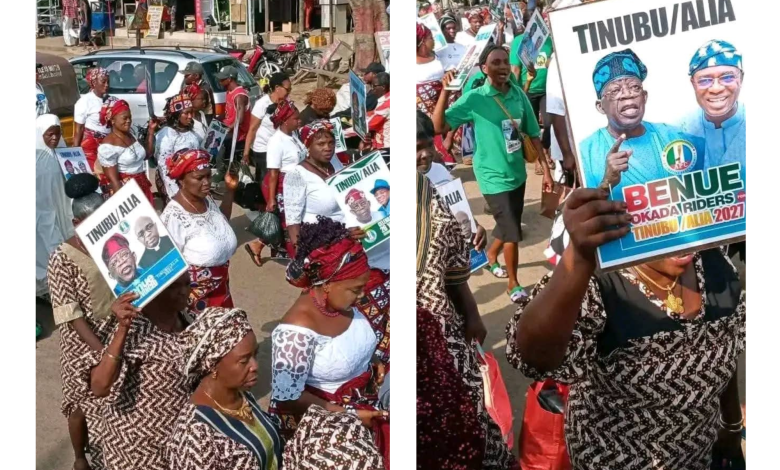
What does it take to make a people spit on their own dead?
Benue answered that sickening question on June 12, 2025. While corpses littered farmlands, streets and communities, while widows wailed in IDP camps, the state’s depraved women and youths danced like programmed robots for President Bola Tinubu and Governor Hyacinth Alia – the very men who’ve failed to stop their slaughter. They chorused endorsement for the duo’s reelection in 2027.
This was worse than nonsense.
Let’s be clear: the Makurdi carnival wasn’t organic; it wore the regalia of coercion and inducement.
What won’t a hungry man do for a pot of soup? What won’t a desperate woman accept to silence her crying child’s stomach? This is the real tragedy of Benue – not just the killings by herdsmen, but how our politicians have turned poverty into a weapon against their people. When you’re hungry, even your enemy’s food smells sweet.
The painful truth? These rallies change nothing. Tomorrow, the killings will continue. Security agents will say they cannot confront the killers without receiving an “order from above” to do so. Next week, more villages will be attacked. And the same politicians being celebrated today will be nowhere to be found when the next massacre happens.
Read Also: Emerging Development Commissions And A Threatening Past
The primary duty of any government is the protection of lives and property. On this fundamental obligation, both the federal and Benue State governments have failed spectacularly. The herdsmen attacks are not new; they are not unpredictable. They follow a well-documented pattern of violence, displacement, and impunity. Yet, the response has been a familiar cocktail of hollow condemnations, half-hearted security measures, and, most damningly, political exploitation.
Governor Hyacinth Alia, like his predecessors, has offered little beyond rhetoric. The federal government, despite its vast security apparatus, has treated Benue’s agony with alarming indifference. And now, rather than being held to account, these leaders are being feted by the very people they have failed.
How does this happen? How does a population under siege become complicit in its subjugation? The answer lies in the well-oiled machinery of political manipulation. The rally in Makurdi was not organic; it was orchestrated. The usual suspects—political contractors, compromised youth leaders, and opportunistic elites—were mobilized to transform genuine anguish into a staged endorsement.
This is not governance; it is theatre. And it is a damning indictment of a political culture that prioritizes power over people, optics over outcomes. The sponsors of this rally know exactly what they are doing. They understand that in Nigeria, suffering can be commodified, and pain can be repackaged as loyalty.
The people of Benue must ask themselves: What did this rally achieve? Did it bring back the dead? Did it restore pillaged communities? Did it put a single herdsman in jail? Or did it merely serve as a photoshoot session for politicians who have done nothing to earn such adulation?
True change will not come from rented crowds and scripted chants. It will come when the people of Benue refuse to be pawns in this cynical game.
Until then, the bloodshed will continue, the rallies will multiply, and the politicians will keep laughing to 2027.
What a tragic, absurd cycle!




